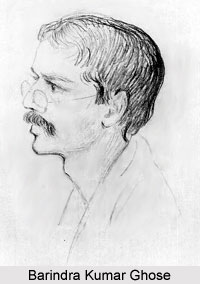 Barindra Kumar Ghose was the youngest son of Dr.Krishnadhan Ghose, renowned physician and a reputed district surgeon and Swarnalata Ghose, daughter to famous Brahmo religious and social reformer Rajnarayan Basu. Monmohan Ghosh ,scholar of English literature, a poet and professor of English at Presidency College, Calcutta and at Dacca University , was Barindra`s second elder brother and his third elder brother was the national activist, revolutionary and spiritualist, Shri Aurobindo Ghose.
Barindra Kumar Ghose was the youngest son of Dr.Krishnadhan Ghose, renowned physician and a reputed district surgeon and Swarnalata Ghose, daughter to famous Brahmo religious and social reformer Rajnarayan Basu. Monmohan Ghosh ,scholar of English literature, a poet and professor of English at Presidency College, Calcutta and at Dacca University , was Barindra`s second elder brother and his third elder brother was the national activist, revolutionary and spiritualist, Shri Aurobindo Ghose.
Barindra Kumar Ghose was born at Norwood near London on 5th January in 1880. Later they came back to India and Barindra Kumar Ghose completed his schooling in Deoghar and passed the entrance examination in 1901 and joined Patna College. He spent a few days in Dacca with Monmohan Ghose , his elder brother and came across Professor Kalipada Basu, an eminent Mathematician. In Baroda he received military training. At the same time he had adequate study in History and Politics. During late 1800s to early 1900s Barindra Kumar Ghose was highly influenced by Aurobindo and was attracted towards the revolutionary movements and political activities.
In 1902, Barindra Kumar Ghose returned to Kolkata and with the help of Jatindranath Bannerjee started forming several revolutionary groups. In 1906, in the heydays of the Swadeshi Movement, he started publishing Yugantar, a Bengali weekly and a revolutionary organization also named Yugantar, formed from the inner circle of Anushilan Samiti. The popularity of Yugantar among the younger generations and activists compelled the British Government to be skeptical about Barindra Kumar Ghose`s motive. In 1907, he started the Maniktala group with Bagha Jatin and a few young revolutionary activists for the collection of arms and ammunitions and manufacturing explosives. After the attempted killing of Kingsford by Khudiram Basu and Prafulla Chaki, the police through their intense investigation arrested Barindra Kumar Ghose on 2nd May in 1908 and many of his comrades were also arrested. Barindra Kumar Ghose was sentenced to death by the trial known as Alipore Bomb Case. Later the sentence was commuted to life imprisonment and was sent to the Cellular Jail in Andaman in 1909.
In 1920, Barindra Kumar Ghose was released. He came to Calcutta and owned one of the best printing houses and started his career in journalism. Later he decided to set up an Ashram in Kolkata and retired from business. In 1923 he set out for Pondicherry the Sri Aurobindo Ashram and was deeply motivated by his elder brother, Aurobindo and started imbibing the aesthetic values of spirituality and sadhana. In 1929 Barindra Kumar Ghose returned to Kolkata and started his career in Journalism afresh. In 1933 Barindra Kumar Ghose launched English weekly, The Dawn of India. He was also associated with The Statesman and earned the title as a columnist. In 1950, he became the editor of the Bengali daily Dainik Basumati. In 1933, he was married to Sailaja Dutta, a widow of a respectable family. At the age of seventy nine on 18th April in 1959 Barindra Kumar Ghose breathed his last. . He engaged himself in various literary activities in different languages, which came into light recently.






